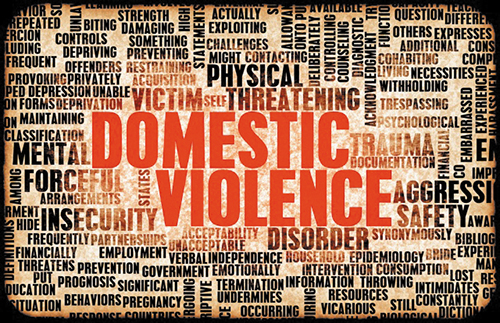
October is national domestic violence awareness month, a month devoted to raising the national consciousness about the pervasiveness of this problem and its impact on millions of families throughout this country. No culture is immune, no socio-economic group does not have its share of perpetrators and victims. We recently witnessed the fallout regarding Ray Rice, the former Baltimore Ravens running back, who was indefinitely suspended after video footage surfaced showing him beating his fiancee, now wife, at an Atlantic City casino. The NFL’s initial response was a two game suspension that was revisited and expanded to an indefinite suspension when the public objected to that as being too lenient. Even with public pressure, the NFL response has been underwhelming.
Mr. Rice, who has not yet had his day in court, is publicly remorseful. He said, “I will forever regret that single incident that was inexcusable.” Those of us who work in the domestic violence field know that it is unlikely that this was a single incident. To get to the point of physically attacking a woman, her partner has undoubtedly endured years of increasing contempt and disregard for her personhood. Domestic violence is on a continuum of escalating attacks: emotional, psychological, financial and finally physical. These assaults often happen in a cycle; a cycle that begins with positive behaviors and escalates as tension builds up to an explosive incident, only to be followed by renewed “honeymoon behaviors.” These cycles can occur over the course of a year, or many mini cycles in the course of days or weeks. In each case, the goal is control of the victim, and the patterns confuse and distort the reality of the lives of those who are suffering.
Unfortunately the Jewish community is not immune to this pervasive social problem. Project S.A.R.A.H. (Stop Abusive Relationships At Home) cornerstone mission is to erode the general denial that this problem exists. Until denial is penetrated, no change can take place. For example, as long as rabbis report that no one in their congregation was ever a victim of domestic violence, the chances that a woman would turn to that rabbi for help is slim. Project S.A.R.A.H. has addressed this issue by years of presenting a public awareness campaign called “Many Voices, One Message.”
This campaign asks rabbis of every denomination throughout the State of New Jersey to take a public stand against domestic violence during the month of October. Each year, more and more rabbis have stepped up, and this year over 200 rabbis will make public statements in their synagogues about domestic violence. These statements lift the veil of secrecy hiding the problem exists in our community and helps victims know that their rabbi is available as a resource. Often, those rabbis turn to Project S.A.R.A.H. for guidance and as a referral for their congregants.
Project S.A.R.A.H. has been in the domestic violence field for more than 16 years. We have worked with hundreds of victims who could barely identify the toxic patterns in their marriages. They just knew that they were unhappy and that things at home should not be so difficult. Once the victims began looking at the reality of their lives, they began to make informed decisions about what to do. In some cases, it was a clear demand that the spouse receive mental health assistance to accept his/her behavioral problems and begin to shift the response. In other cases, it was a decision to leave the relationship. These decisions are fraught with difficulties, including legal and financial obstacles, the need to obtain a “get,” (which has its own set of abuses and issues) and social pressure that pressures people to maintain even the most troubled marriages. However, once the veil of denial is lifted, the victim becomes an agent of change in her/his own life.
A time that denial is particularly pervasive and powerful is when young men and women begin dating. Imagine an Orthodox 23-year-old woman whose friends are all married or engaged. Her parents are eager for her to find her match. She meets a charming young man but early on there are subtle signs that he is controlling: he comments about her friends and family in negative ways; he is not forthcoming about finances; she is not feeling good about herself and generally feels like she’s walking on eggshells when she’s with him. Nonetheless, she overlooks all of that because she hopes and convinces herself that everything will straighten itself out once she’s married. It is all too easy to deny the warning signs and proceed with marriages that often become emotional nightmares for the couple.
To address this reality, Project S.A.R.A.H. has created relationship videos specifically designed for the Orthodox community. These videos are intended to educate young people of marriageable age about the potential problems they may encounter and the need to avoid denial. During domestic violence awareness month and every month, we at Project S.A.R.A.H. remain committed to working with rabbis, educators, parents and all community members on defeating the denial that exists regarding domestic violence in our community and providing a brighter future for all of us.
By Esther East, Project S.A.R.A.H.











